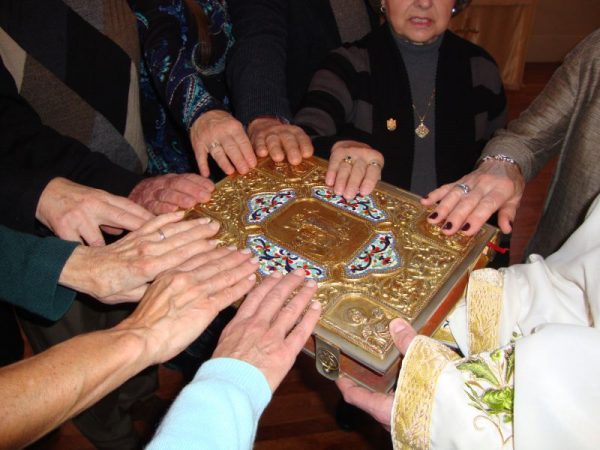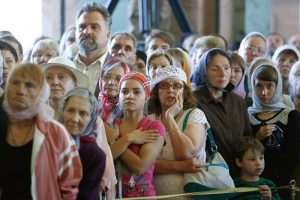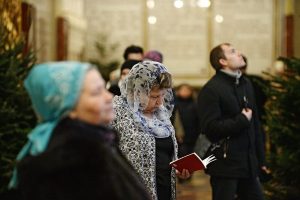Parish Councils are like personal computers in a number of ways. The initials for both are P.C.; neither existed before very modern times, and we can scarcely imagine life in the church here in the West without them.
It is sobering and somewhat instructive to learn that in the early church parish councils didn’t exist. Well, actually they did, but they consisted of the local council of presbyters. In the first several centuries, the local pastor was the bishop, who presided over and was the focal point of unity for all the churches in the city or village. The bishop was the one whose confession of faith determined the faith his flock, and he was the one who accordingly presided at every baptism that took place in the city or village. Accordingly they saw their bishop every Sunday; he was the one who personally excommunicated anyone needing excommunication and he was the one who welcomed them back and restored them to Eucharistic communion when they repented, laying his hands upon them and praying for their absolution.
But he did not make the pastoral or administrative decisions: those were made by his local council of presbyters. Thus, for example, if the church had a candidate for reader or subdeacon, the decision to ordain or not to ordain was made by the presbyteral council, not by the bishop. Obviously the bishop had a fair bit of moral clout, and his own opinion and wishes usually carried the day. But the power of administrative and pastoral decision lay with his council, not solely with him. (How things have changed. If you want to see the canons mandating the change, you can’t. There aren’t any.) The presbyters were not elected each year for a term of office as present-day parish council members are. They were chosen and then ordained by the bishop for life. If all of the congregation couldn’t fit into one place and required a second meeting place, this second “overflow” congregation was presided over by one of the presbyters. But the bishop still remained the pastor for all the Christians in the same village.
That was then, this is now. Today the bishop usually lives and liturgizes at a tremendous distance from most of the congregations over which he has pastoral charge, and his presbyteral council is correspondingly scattered over a large area. The presbyters no longer serve together each Sunday at the same Liturgy, but serve in their own little congregations, often in great isolation one from another. The bishop’s oversight, of necessity, is minimal.
But not, however, the oversight of the secular government. In the West, churches are registered in that clergy are licenced by the State to perform and register marriages and (in Canada anyway) receive little official slips of paper after burying the dead. Money given to the church is eligible for tax-deductible receipts, so that in church we render both to God and to Caesar.
Part of the regulation of churches (again, in Canada anyway) involves their registration as Charitable Societies (hence those tax receipts), and that includes the legal necessity of having Annual General Meetings of the membership, having a Constitution and By-laws and periodic meetings of the Board of Directors—a.k.a. the Parish Council. The Church of the first centuries had no AGMs, no Constitution or By-laws, no tax receipt eligibility—and no Parish Council. They didn’t need them, for the Church kept itself as far from government supervision (i.e. from persecution) as it could manage, and the bishop and the presbyters made all the decisions, including the financial ones.
Given the scattering of the so-called “local church” over a wide area and the resultant scattering of the presbyters from each other, the help from the Parish Council becomes a matter of necessity even apart from the watchful eye of Caesar. Bluntly put, there is no way a single parish priest could take care of the multitude of concerns affecting his congregation, and help from other members of the flock has become indispensible. The healthy functioning of these Parish Councils and their healthy relationship with the priest are matters crucial to the health of the parish.
As any priest who has been at his job for longer than several months can tell you, such healthy function cannot always be presumed. I remember one dear priest who discovered that something needed to be done or purchased in his parish, and he said to another person in the parish, “Just do it. I’ll fight with the Parish Council later.” Sometimes the Parish Council consists of people intent on running the parish and treating the priest like a paid employee whose only job is to serve Liturgy and do what he is told. Sometimes it is the priest who is the bully, and who tyrannizes and abuses the people under him, including his long-suffering Parish Council. Sometimes Parish Councils become old boys’ clubs (or old girls’ clubs) with its members clinging to power and office like big fishes in little ponds and refusing to allow “younger blood” (i.e. anyone else) to be elected to office. Sometimes it is the bishop who makes life interesting. I remember one situation (not in my jurisdiction!) where the bishop demanded that each parish contribute a set amount to his central fund. One parish demurred and the bishop put the squeeze on the parish priest to make the parish cough up the money. Said priest found himself in a tight spot, canonically responsible to his bishop but in fact financial responsible and dependent upon his Parish Council. Where’s voluntary euthanasia when you need it?
A good description for the functioning of priest and Parish Council can sometimes be found where least expected—in the jurisdictional by-laws. Thus The Statute of the Orthodox Church in America (1991 edition) reads in part: “At the head of the parish is its Rector. According to the teachings of the Church, he is the spiritual father and teacher of his flock and the celebrant of the liturgical worship …No activities in the parish can be initiated without his knowledge, approval, and blessing; neither should he do anything pertaining to the parish without the knowledge of his parishioners and parish organs elected by them, so that always and everywhere there may be unity, mutual trust, cooperation, and love.” Note the mutuality between priest and Parish Council (the “parish organs”): no activities can be initiated with his knowledge, nor may he initiate them without the knowledge of the Council.
Given this mutuality, one may ask the question, “Who is in charge then?” The answer: Christ is. Christ’s love and life are manifested through the joint unity of priest and Parish Council. It is too easy for power struggles to arise, with a kind of administrative tug of war between priest and council. In this wretched mess, which side gets to have its way? And which side has to back down? When it is about power, one might imagine that one side wins and the other side loses, but in fact in this situation everyone loses, for the Church is not about power but about Christ. The aim of priest and Parish Council is to discover and discern Christ’s will in any given situation and then to do it. I remember one day in the early years of our own parish. We had a decision to make about money at an AGM, and the congregation was split down the middle about what to do. I refused to allow the vote to be taken (so much for Roberts’ Rules of Order) and asked them to pray about it during the coming week. They did, and at the later meeting someone made a suggestion for breaking the deadlock which passed unanimously. The point is it is not about power: it is about discerning God’s will together, and this discernment is made jointly by priest and Parish Council.
This means that the priest should come to the Parish Council realizing that priesthood is not about power but about love, service, and washing the feet of his people. If he doesn’t understand this he should take off the cassock and get another job. The people of the Parish Council should regard their task as a ministry for Christ, for which they will be judged at the Last Day, and part of this ministry involves supporting and loving their priest. Like the dry and dusty Statute said: unity, mutual trust, cooperation, and love. Mutual love between priest and Parish Council are essential if the parish is to function properly.
I would end with two final questions for council members and priest respectively. For Parish Council members: do you understand that your priest is your papa, and that supporting him in prayer, word, and deed, is your top priority? And for the priest: are you willing to lay down your life for your sheep as all good shepherds are willing to do? These questions are not simply rhetorical. They will be asked and an answer demanded before the dread judgment seat of Christ. I would also like to add a quick addendum here, giving thanks to God for my own Parish Council. They are indescribably wonderful, and a gift from God.




















